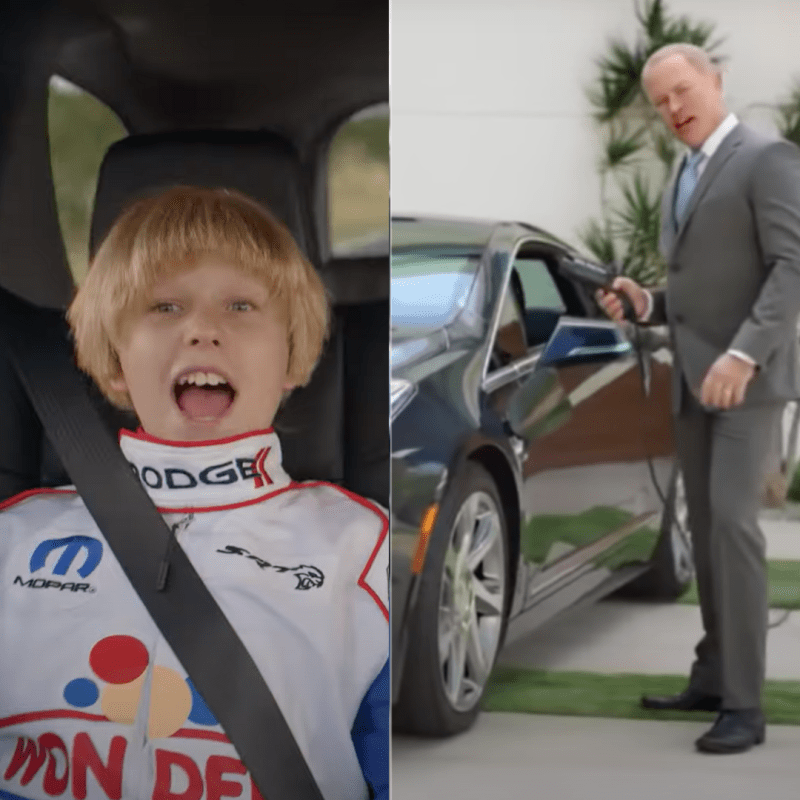Editor's note: this is second semi-final bout in our contest to find America's most toxic car ad. Don't forget to scroll to the bottom to vote — and don't miss your last chance to vote in the other Final Four battle, Dodge Demon vs. Chevy Colorado, before polls close at midnight, Eastern time, on Wednesday, Nov. 3. It's a tight race, so your vote will really count.
We're finishing out the semi-finals with another battle of the bad dads — and this one's a doozy.
From a chino-clad workaholic in a starchitect-designed mansion to a semi-professional race car driver down on his luck, the ostensible heroes of these two spots couldn't be more different. But they're both working together across stereotypical class divides to create something truly toxic: a culture that celebrates owning expensive, deadly cars, regardless of how much money you've got in the bank.
We're joined again by guest commentator Danny Harris, executive director of Transportation Alternatives and one of the leading voices calling for regulations on corrosive commercials like these.
Let's get to it. Remember, the winner of this battle faces off against the winner of the other Final Four battle: the Dodge Demon vs. the Chevy Colorado. Will voters opt for the first ever Dodge vs. Dodge battle? Let's see:
The Cadillac ELR Coupe
The "crazy, hard-working believer" at the center of this spot didn't have to work particularly hard to beat the competition in the quarterfinal, where it snatched 76 percent of the vote over an Infiniti ad about the joys of almost running over spectators at the Chicago marathon. That's a seriously huge margin — but as Harris points out, it's not quite as serious as the national auto-lending crisis that this celebration of auto consumerism conveniently ignores.
"You only need to look at how many Americans are going into crippling automotive debt to understand why this ad is toxic," Harris said. "Car companies are preying on people by putting them in these dangerous financial situations. Whatever this ad tells you, it’s not a good thing if you only get two weeks of holidays — because you probably need to work that much just to afford your car."
Harris isn't exaggerating. Between 2009 and 2019, Americans' collective auto debt soared 75 percent, driven largely by the rising market share of relatively expensive (and for auto companies, far more profitable) SUVs, pick-ups and other light trucks — and that was before the post-quarantine consumer boom sent both average auto prices and overall light-truck sales soaring to new historic highs. And because megacars are two to three times more likely to be fatal to a pedestrian in the event of a crash than smaller models, vulnerable road user deaths also soared over the same period.
Of course, smaller expensive cars like the ELR coupe ($65,995) still aren't great for American roads, or the finances of American families who buy them — even if they're electric, as this model was.
"Car companies are greening themselves by building vehicles that will make our streets run red," Harris said. "Even smaller EV models are heavier [which can make them more fatal to vulnerable road users]. And you can see in this ad how automakers are overcompensating on the macho as we move away from fossil fuels to a charger. How else are they going to convince the the folks who like rolling coal to transfer over to the EV market? We're lucky they aren't putting gun turrets on top of electric pick-ups yet."
The Dodge Truancy
In the quarterfinals, this nostalgic ode to vintage NASCAR culture (and a 15-year old satire of it, Talladega Nights) sped past a futuristic spot that tried to sell consumers on an autonomous Mercedes that literally does not exist yet, claiming a commanding 84 percent of the vote.
That cinched one of their two spots in the semi-finals — spots that Harris says they sorely deserve.
"When you think that Dodge can do no worse, they find ways to lower the bar," Harris said. "The question isn’t whether their ads should be regulated; it's whether the company should be subject to legal action for promoting road violence."
Commercials like this aren't the only place where Dodge drivers routinely break roadway laws. Insurance companies consistently find that Dodge drivers are among the most likely to drive under the influence, get stopped for speeding, and engage in reckless driving, at least for certain models like the Challenger, which has been the subject of a few toxic commercials of its own.
This spot doesn't actually name the SUV it's ostensibly trying to sell, which is why we're calling it the Dodge Truancy. But even though it's being marketed as a family car, the automaker is still mostly appealing to buyers' need for speed.
"I don’t understand, as a parent, why anyone with kids would see that ad and say that this is the car for them," said Harris. "If you remove all the jokes from this ridiculous movie, you end up with two children in the back of a car and a parent breaking just about every rule of the road as some sort of bonding ritual. But it's not a bonding ritual; it's child endangerment. The leading cause of death for kids in the U.S. is traffic violence. Dodge isn’t just being tone deaf here. They’re passing road violence as a value to another generation."
We'll have more on how to break that legacy of toxic car culture in the next round. But for now, let's vote.
Polls in this contest will remain open until Monday, Nov. 8 at 11:59 p.m.
[poll id="201"]
Here's the full bracket if you're playing along at home.






